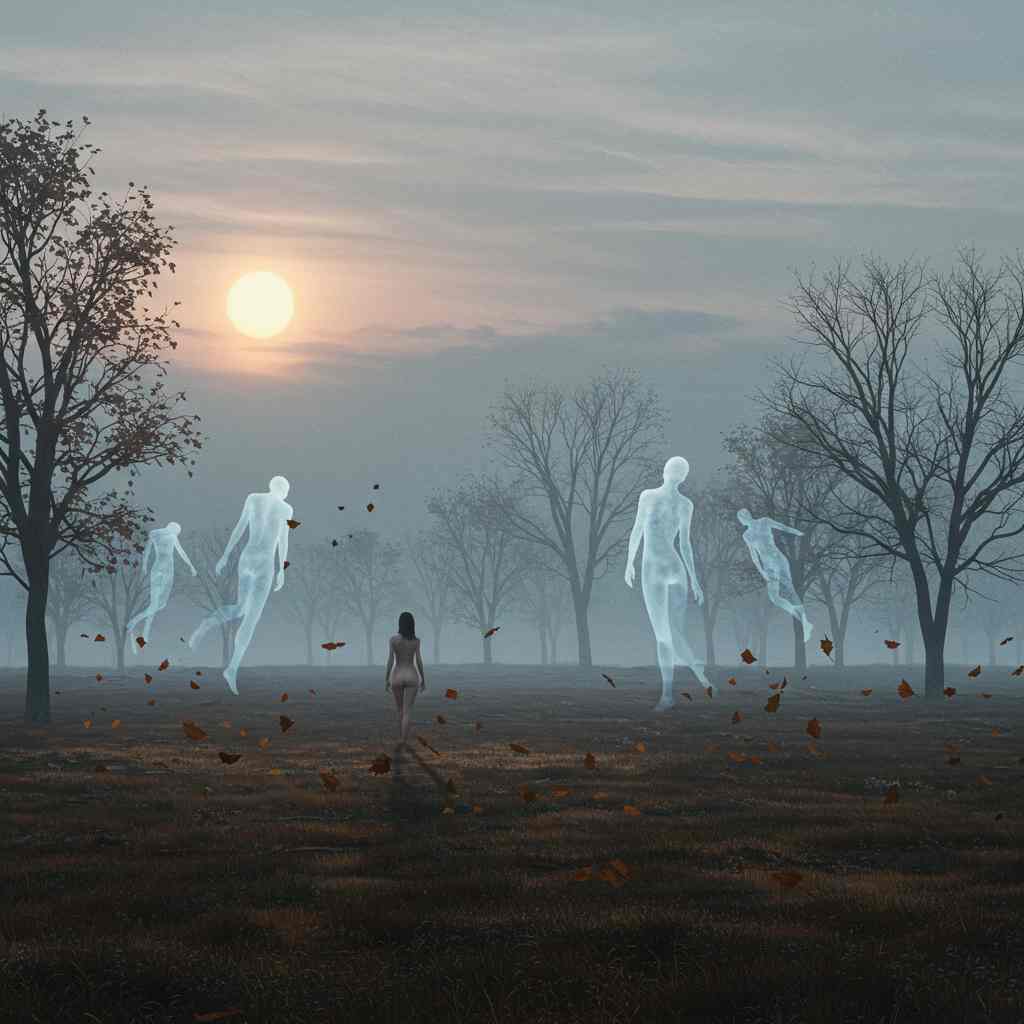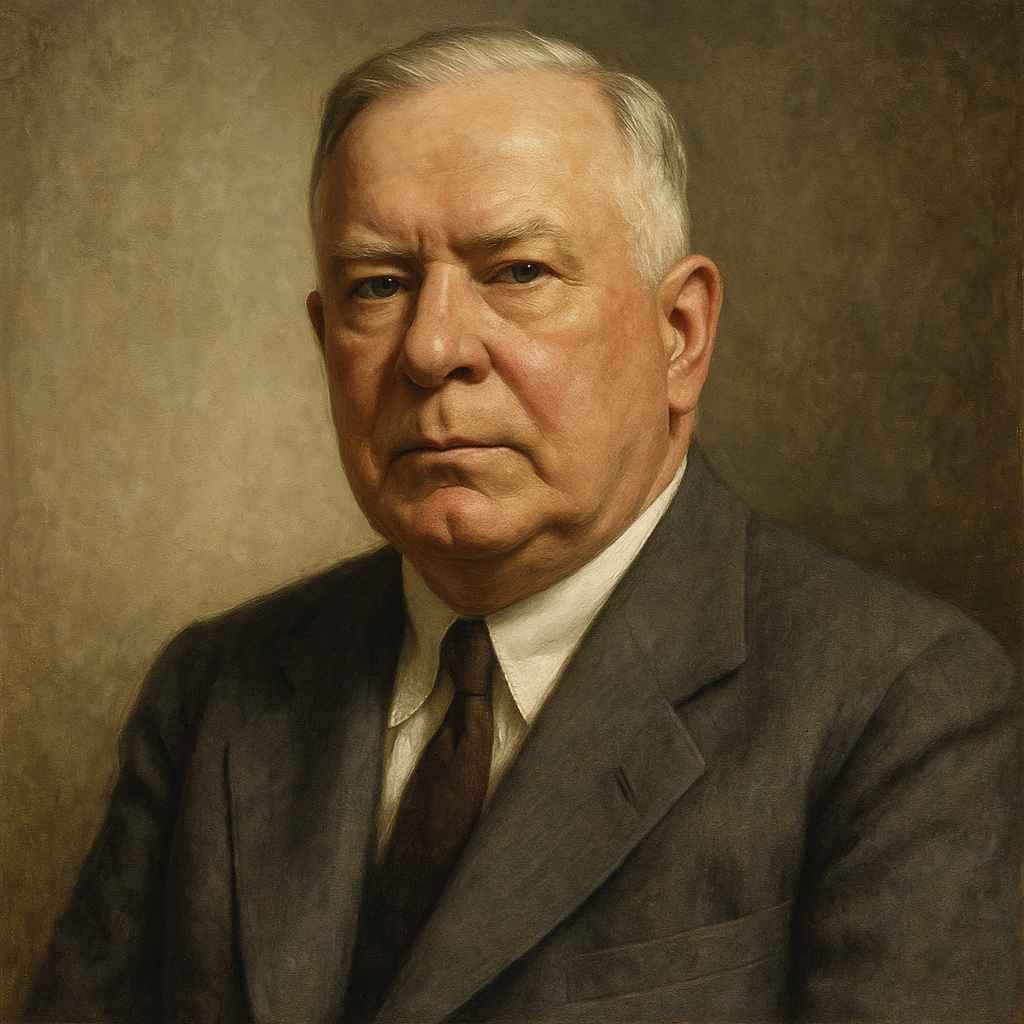Anatomy of Monotony
Wallace Stevens
1879 to 1955

If from the earth we came, it was an earth
That bore us as a part of all the things
It breeds and that was lewder than it is.
Our nature is her nature. Hence it comes,
Since by our nature we grow old, earth grows
The same. We parallel the mother’s death.
She walks an autumn ampler than the wind
Cries up for us and colder than the frost
Pricks in our spirits at the summer’s end,
And over the bare spaces of our skies
She sees a barer sky that does not bend.
The body walks forth naked in the sun
And, out of tenderness or grief, the sun
Gives comfort, so that other bodies come,
Twinning our phantasy and our device,
And apt in versatile motion, touch and sound
To make the body covetous in desire
Of the still finer, more implacable chords.
So be it. Yet the spaciousness and light
In which the body walks and is deceived,
Falls from that fatal and that barer sky,
And this the spirit sees and is aggrieved.
Wallace Stevens's Anatomy of Monotony
Wallace Stevens, one of the most formidable voices in modernist poetry, often grappled with themes of perception, reality, and the human condition in relation to the natural world. Anatomy of Monotony, though less frequently anthologized than some of his more famous works, is a profound meditation on existence, mortality, and the inexorable passage of time. Through its restrained yet evocative imagery, the poem interrogates humanity’s place within the natural order, suggesting an inescapable monotony that governs both the individual and the cosmos. This essay will explore the poem’s philosophical underpinnings, its use of literary devices, its emotional resonance, and its place within Stevens’ broader oeuvre.
Historical and Philosophical Context
Stevens wrote during a period of immense intellectual upheaval—modernism’s peak—when traditional religious and philosophical certainties were being dismantled. The early 20th century saw the rise of existentialism, phenomenology, and a growing secularism that questioned humanity’s significance in an indifferent universe. Anatomy of Monotony reflects this disillusionment, presenting a world where human life is inextricably bound to the cycles of nature, devoid of transcendent meaning.
The poem’s title itself suggests a clinical dissection (anatomy) of something often dismissed as trivial (monotony). Stevens, who worked as an insurance executive while writing poetry, was deeply attuned to the repetitive rhythms of daily existence. Yet, rather than lamenting this repetition, he examines it with a detached, almost scientific rigor. The poem’s philosophical stance aligns with the ideas of thinkers like Schopenhauer, who saw life as governed by cyclical suffering, and Nietzsche, who urged individuals to find meaning in the face of an indifferent universe.
Thematic Analysis: Earth, Mortality, and the Illusion of Comfort
The poem opens with a striking assertion:
If from the earth we came, it was an earth
That bore us as a part of all the things
It breeds and that was lewder than it is.
Here, Stevens posits humanity’s origin as purely terrestrial, stripping away any romanticized notions of divine creation. The word lewder (an archaic term meaning warm or fertile) suggests a primal, generative earth, more abundant in the past than in the present. This introduces the theme of decay—both of the earth and of human life. The line Our nature is her nature reinforces the idea that humans are not separate from nature but subject to its same laws of aging and death.
The poem then shifts to a personification of the earth as a dying mother:
She walks an autumn ampler than the wind
Cries up for us and colder than the frost
Pricks in our spirits at the summer’s end.
Autumn, a traditional symbol of decline, is rendered more expansive (ampler) than the wind’s lament, suggesting a vast, impersonal force of decay. The frost that pricks in our spirits evokes both physical and emotional coldness, reinforcing the inevitability of decline. The image of the barer sky that does not bend suggests an unyielding, indifferent universe—one that offers no solace or divine intervention.
The second stanza introduces a momentary illusion of comfort:
The body walks forth naked in the sun
And, out of tenderness or grief, the sun
Gives comfort...
Here, the sun—a traditional symbol of vitality and divinity—appears to offer solace. Yet this comfort is fleeting, even deceptive. The other bodies that come, twinning our phantasy and our device, suggest human relationships and artistic creations (phantasy and device) that momentarily distract us from our fate. However, these distractions only make the body covetous in desire / Of the still finer, more implacable chords—an insatiable longing for something beyond reach, perhaps beauty or transcendence.
The final lines deliver a sobering realization:
Yet the spaciousness and light
In which the body walks and is deceived,
Falls from that fatal and that barer sky,
And this the spirit sees and is aggrieved.
The spaciousness and light that seemed to offer freedom are revealed as illusions, emanating from the same indifferent sky. The spirit, once deceived, now recognizes the truth and is aggrieved—a quiet but devastating admission of existential sorrow.
Literary Devices and Imagery
Stevens’ mastery of imagery is evident throughout the poem. He employs stark, elemental contrasts—earth and sky, warmth and cold, light and bareness—to underscore the poem’s themes. The autumn ampler than the wind and the frost / Pricks in our spirits are examples of synesthetic imagery, blending sensory experiences to evoke a visceral response.
The poem’s structure is deliberate, moving from a cosmic perspective (earth, sky) to the intimate (the body, the spirit). This shift mirrors the human tendency to seek meaning in the personal before confronting the impersonal vastness of the universe.
Stevens also uses paradox effectively. The sun, typically a symbol of life, gives comfort out of tenderness or grief—suggesting that even warmth is tinged with sorrow. The phrase implacable chords is particularly striking, evoking both music (harmony, art) and something unyielding (implacable), reinforcing the tension between human creativity and cosmic indifference.
Comparative Readings and Stevens’ Broader Work
Anatomy of Monotony shares thematic concerns with Stevens’ more famous poems, such as Sunday Morning and The Snow Man. In Sunday Morning, Stevens meditates on mortality and the search for meaning in a post-religious world, concluding that death is the mother of beauty—a sentiment echoed in Anatomy of Monotony’s acknowledgment of decay as an inescapable force.
The Snow Man, with its famous line One must have a mind of winter to behold nothing that is not there and the nothing that is, similarly grapples with perception and reality. Both poems reject sentimentalism in favor of a stark, almost ascetic clarity.
Comparisons can also be drawn to T.S. Eliot’s The Waste Land, which similarly depicts a fragmented, disillusioned world. However, where Eliot’s poem is densely allusive and culturally apocalyptic, Stevens’ work is more meditative, focusing on the individual’s confrontation with the natural world.
Emotional Impact and Modern Relevance
Despite its philosophical detachment, Anatomy of Monotony carries a profound emotional weight. The poem’s acknowledgment of monotony—not as mere boredom, but as an existential condition—resonates deeply in an age of routine, automation, and environmental anxiety. The final lines, where the spirit sees the truth and is aggrieved, evoke a quiet despair that many readers may recognize: the moment when illusions fall away, and one must face reality unadorned.
Yet, Stevens does not wallow in despair. There is a dignity in his clear-eyed acceptance of the world as it is. In this sense, the poem aligns with Camus’ notion of absurd perseverance—finding meaning not in transcendence, but in the act of enduring.
Conclusion
Anatomy of Monotony is a masterful exploration of humanity’s place in a indifferent universe. Through its rich imagery, philosophical depth, and emotional restraint, the poem captures the tension between human longing and cosmic reality. Stevens does not offer easy consolations; instead, he presents a world where beauty and decay coexist, where the sun’s comfort is fleeting, and where the spirit’s grief is the price of clarity.
In an era increasingly defined by environmental crisis and existential uncertainty, the poem’s meditation on cyclical decline feels strikingly relevant. It reminds us that monotony is not merely the repetition of days, but the fundamental condition of existence—one that, when confronted honestly, can yield its own austere beauty. Stevens’ genius lies in his ability to render this truth with both precision and poetic grace, inviting readers to see the world anew, even in its barest form.
This text was generated by AI and is for reference only. Learn more
Want to join the discussion? Reopen or create a unique username to comment. No personal details required!



Comments
No comments yet. Be the first to comment!